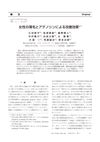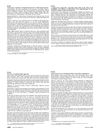 26 citations,
November 1993 in “Progress in Neuro-psychopharmacology & Biological Psychiatry”
26 citations,
November 1993 in “Progress in Neuro-psychopharmacology & Biological Psychiatry” Treatment during development affects hormone balance and sexual behavior in male rats.
 February 2008 in “Journal of The American Academy of Dermatology”
February 2008 in “Journal of The American Academy of Dermatology” ROS may affect hair loss related to hormones.
 1 citations,
January 2011 in “Journal of S C C J”
1 citations,
January 2011 in “Journal of S C C J” Adenosine lotion improves hair thickness and density in women with thinning hair.
 52 citations,
September 2018 in “International Journal of Molecular Sciences”
52 citations,
September 2018 in “International Journal of Molecular Sciences” Ginseng and its compounds may help hair growth and prevent hair loss, but more human trials are needed to confirm this.
 1 citations,
April 2006 in “Seminars in Reproductive Medicine”
1 citations,
April 2006 in “Seminars in Reproductive Medicine” Androgen therapy might help some women with low libido, but it has risks and should be used carefully.
 3 citations,
February 2008 in “Basic and clinical dermatology”
3 citations,
February 2008 in “Basic and clinical dermatology” Telogen Effluvium is a hair loss condition where treatment involves identifying and managing its triggers.
 March 2024 in “Ukraïnsʹkij žurnal dermatologìï, venerologìï, kosmetologìï”
March 2024 in “Ukraïnsʹkij žurnal dermatologìï, venerologìï, kosmetologìï” Insulin resistance significantly contributes to the development and severity of certain chronic skin diseases.
 12 citations,
May 2005 in “Current obstetrics and gynaecology/Current obstetrics & gynaecology”
12 citations,
May 2005 in “Current obstetrics and gynaecology/Current obstetrics & gynaecology” Hirsutism is too much hair growth in women like the pattern in men, often caused by high male hormones, and can be treated with hormone control and hair removal methods.
 November 2022 in “Journal of the Endocrine Society”
November 2022 in “Journal of the Endocrine Society” A rare ovarian tumor caused high testosterone and excess hair in a woman, which was resolved after tumor removal.
 March 2024 in “Journal of Rawalpindi Medical College/Journal Rawalpindi Medical College”
March 2024 in “Journal of Rawalpindi Medical College/Journal Rawalpindi Medical College” Skin issues are common and important for diagnosing PCOS.
June 1986 in “Journal of the American Academy of Dermatology” Topical minoxidil showed promise for early male pattern baldness.
 August 2024 in “Quality in Sport”
August 2024 in “Quality in Sport” New treatments for common hair loss are needed.
 July 2024 in “Plastic and Aesthetic Research”
July 2024 in “Plastic and Aesthetic Research” Careful planning and accurate diagnosis are crucial for successful hair restoration surgery.
February 1996 in “Clinical Pharmacology & Therapeutics” MK-386 reduces sebum DHT levels.
 November 2024 in “Annals of PIMS-Shaheed Zulfiqar Ali Bhutto Medical University”
November 2024 in “Annals of PIMS-Shaheed Zulfiqar Ali Bhutto Medical University” Trichoscopy is an effective, non-invasive way to diagnose telogen effluvium.
 13 citations,
July 2001 in “International Journal of Dermatology”
13 citations,
July 2001 in “International Journal of Dermatology” Inflammation and Demodex mites might contribute to hair loss, and targeting them could help treat it.
 229 citations,
August 2002 in “Experimental Gerontology”
229 citations,
August 2002 in “Experimental Gerontology” AGA causes hair loss by shrinking hair follicles due to DHT binding, and can be treated with finasteride and minoxidil.
 17 citations,
November 2002 in “Australasian Journal of Dermatology”
17 citations,
November 2002 in “Australasian Journal of Dermatology” Saw palmetto causes allergic reaction, minoxidil causes skin irritation; use cautiously for hair loss.
 27 citations,
March 2014 in “Experimental Dermatology”
27 citations,
March 2014 in “Experimental Dermatology” IGF-1 affects hair loss and could be a potential treatment.
11 citations,
January 2019 in “International Journal of Trichology” Mesotherapy is not significantly better than minoxidil for treating male hair loss.
January 2023 in “Springer eBooks”  February 2014 in “Journal of medical sciences”
February 2014 in “Journal of medical sciences” Treating androgenic alopecia can significantly increase hair thickness, especially in males, with hair color and scalp location also affecting hair diameter.
2 citations,
September 2011 in “Revista de Ciências Farmacêuticas Básica e Aplicada” The chili pepper shampoo was safe and well-liked by volunteers.
 January 2008 in “Journal of The American Academy of Dermatology”
January 2008 in “Journal of The American Academy of Dermatology” Trichoscopy is a helpful and quick method to identify different types of hair loss in women.
 25 citations,
July 2017 in “Archives of Dermatological Research”
25 citations,
July 2017 in “Archives of Dermatological Research” Herbal products might promote hair growth with fewer side effects, but more research is needed to confirm their safety and effectiveness.
 September 2002 in “Dermatologic Surgery”
September 2002 in “Dermatologic Surgery” The recipient site can affect the growth and survival of transplanted hair but not its thickness.
 51 citations,
January 2003 in “Hormone Research in Paediatrics”
51 citations,
January 2003 in “Hormone Research in Paediatrics” Hormones and their receptors, especially androgens, play a key role in hair growth and disorders like baldness.
 8 citations,
March 1979 in “International Journal of Dermatology”
8 citations,
March 1979 in “International Journal of Dermatology” Dr. Vera H. Price's 1979 work emphasizes the importance of accurate diagnosis and personalized treatment for hair loss.
 32 citations,
April 1994 in “Journal of the American Academy of Dermatology”
32 citations,
April 1994 in “Journal of the American Academy of Dermatology” High androgen levels and genetic factors likely cause Becker's nevus and related symptoms.
 August 1994 in “Journal of dermatological science”
August 1994 in “Journal of dermatological science” Different substances affect hair and skin cell growth in various ways.
























